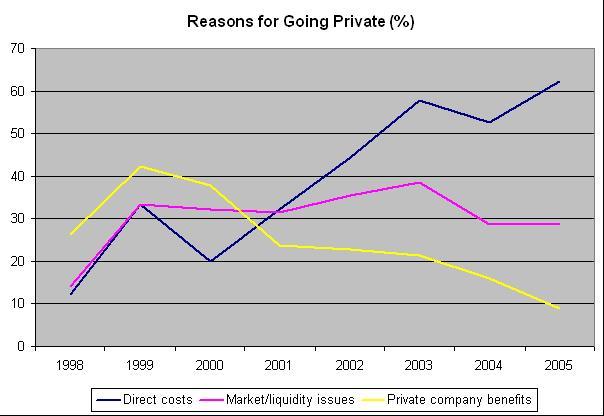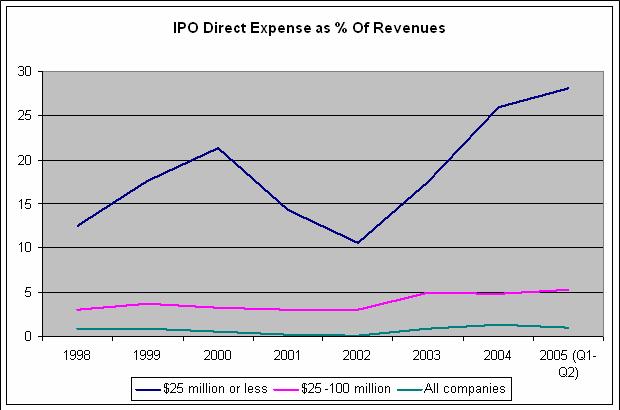The GAO has, at the request of Sen. Olympia Snowe and Rep. Michael Enzi, produced a report analyzing the disproportionate effects of Sarbanes-Oxley on small businesses. Unfortunately, both the report (and the WaPo article summarizing it) downplay the effects of SarbOx on small companies trying to go, or stay, public.
They acknowledgeboth that the companies themselves cite increased costs as a reason for going private, and that administrative costs tend to hit small IPOs disproportionately hard. And yet, the report searches for alternate explanations, such as the consolidation of the accounting industry and the acceptability of only the Big Four as auditors for IPOs.
As a result, issues unrelated to the Sarbanes-Oxley Act, such as market and liquidity issues and the benefits of being private, are also major reasons for companies going private. From 1999 to 2004, more companies cited market and liquidity issues than the indirect costs associated with maintaining their public company status.
But look at the numbers:


The "benefits of being private" are cited less and less frequently, while the number of small companies that just can't afford multiply-redundant accounting costs is shooting through the roof. And if you're looking for the effects of a law passed in 02, using the average from 1999-2004 is a complete non-sequitur.
As for not going public in the first place, it's clear that the 404 reporting requirements are a significant barrier to entry, something the report admits:
While the act does not impose new requirements on privately held companies, companies choosing to go public realistically must spend additional time and funds in order to demonstrate their ability to comply with the act, section 404 in particular, to attract investors....Companies with smaller reported revenues now make up a smaller share of the IPO market. The number of IPOs by companies with revenues of $25 million or less decreased substantially, from 70 percent of all IPOs in 1999 to about 48 percent in 2004 and 31 percent during the first two quarters of 2005. Venture capitalists told us that, on average, a private company had to demonstrate at least 6 quarters of profitability before it could go public and hire an auditor to carry it through the IPO process. According to the venture capitalists, an increasing number of small and mid-sized private companies have been pursuing mergers and acquisitions as a means of growing without going through the IPO process, which now typically costs more than a merger or acquisition.
M&A is perfectly legitimate activity, of course. Indeed, this is exactly the sort of M&A activity that is more likely to succeed, since it typically involves cash, management continuity, earnouts, less publicity, and therefore more honest valuations and less winner's curse risk from competitive bidding.
But the market there is much less liquid, and all of us are still richer than any of us, even if any of us is Exxon or Microsoft. Those deals typically net less than an IPO, and don't subject the firm to the large-scale, Wisdom-of-Crowds scrutiny that the open market does. They typically leave the company less free to pursue its own course, and create all sorts of potential corporate culture issues that an IPO doesn't. They limit growth.
In fact, one issue the report doesn't address is the extent to which smaller public companies' cash flows and valuations are depressed as a result of accounting costs, leaving them more likely to be takeover targets than long-term competitors to older, larger firms.
Fortunately, Sen. Jim DeMint and Rep. Tom Feeney are proposing to exempt small companies from the 404 reporting requirement. Presumably, the market will give us some indication of just how much it values those extra layers of accounting.

































Comments
With regulators telling business that changes to Sarbanes-Oxley are on their way, it's time for some enlightenment about Zen and The Art of Sarbanes-Oxley Compliance. Read about it at:
http://www.soxfirst.com/50226711/zen_and_the_art_of_sarbanesoxley_compliance.php
Posted by: Sox First | May 11, 2006 7:40 PM